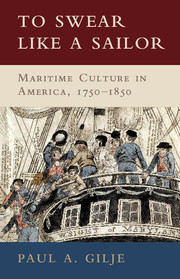‘From the pen of a premier historian of early working and seafaring Americans comes a fascinating new work of cultural history. To Swear like a Sailor starts with the idea that language offers a window into the intellect and the ‘soul’ of the user. Gilje sets out to study the expressions of his saltwater people in literally every form he can trace: curses, jargon, log books, yarns, songs, and drawings. A clever epilogue on the sea chest as the container of a sailor’s trove of worldly possessions packs the whole subject back into a carrying case. The execution is both artful and accessible.’
John L. Larson - Purdue University, and author of The Market Revolution
‘With To Swear like a Sailor, Paul Gilje once more takes us below decks to life in the forecastle. In this meticulously researched, imaginative examination of sailor speech and story, song and scrimshaw, Gilje explores the complex relationships between the reality of shipboard life and the images of Jack Tar produced for American audiences. Not only does this fascinating book illuminate the meanings of sailors’ distinctive argot and shipboard pastimes, it also recovers a popular culture of Jack Tars on stage and in print and sheds new light on the maritime literature of Cooper, Melville, and Dana. It’s a d----d good yarn.’
Tamara Plakins Thornton - State University of New York, Buffalo, and author of Nathaniel Bowditch and the Power of Numbers
‘By listening keenly across the centuries to swearing and storytelling sailors, Paul Gilje brilliantly recovers the lost power of words to shock outsiders and to bind a crew together.’
Alan Taylor - University of Virginia, and author of The Internal Enemy: Slavery and War in Virginia, 1772–1832
‘No historian has a better sense for what coursed through the minds of American mariners during the Age of Sail than Paul Gilje. With a stunning command of seafaring literature, he exhibits an eye for their vision, an ear for their voices, and a willingness to listen to them on their own terms. In To Swear like a Sailor, he lands you in their shoes.’
Daniel Vickers - University of British Columbia
'Paul Gilje’s To Swear Like a Sailor examines in detail the use of language (both foul and fair) by the American sailor from the eve of the American Revolution to the mid nineteenth century … an excellent addition to our understanding of both life afloat and the sailor culture’s integration into the larger society.'
Thomas Malcomson
Source: The Northern Mariner
'In this book, Gilje has provided an insightful cultural history … this is an excellent book that sheds light on Jack Tar’s world and its connections to shore. It should be read by all interested in early American and maritime history.'
Ian Yunker
Source: H-Net
'… a wide-ranging look at the culture of the common seaman and its connections to mainstream culture ashore through an extensive examination of print, literary, and material culture of the period, with particular emphasis on the mariner’s own voice in logbooks, journals, and personal narratives. … In examining successively the language, writing, yarning, singing, reading, and artistry of the seaman, Gilje achieves both a portrait of the American sailor and a history of nationalism in the early Republic.'
Kathryn Mudgett
Source: Early American Literature





